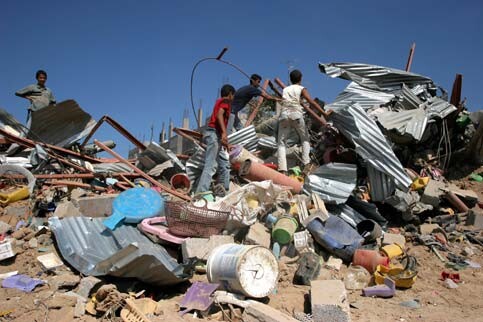Israeli Committee Against House Demolitions 2 September 2006

Palestinians inspect the rubble of a house demolished by Israeli soldiers in the Gaza City neighborhood of Shuja’iyyah, August 31, 2006. (MaanImages/Wesam Saleh)
During the first half of the year 2006, 47 structures were demolished in East Jerusalem by the Municipality of Jerusalem and/or the Ministry of Interior. There were 16 pirate gas stations included in that statistic, therefore a net total of 31 residential structures was demolished. Relative to preceding years, this represents a decline in the number of home demolitions in Jerusalem. Were this decline to continue proportionately for the remainder of the year, the annual number would be approx. 70 structures, i.e. 20 less than in 2005.
One of the possible explanations for the current status of home demolitions relates to an organizational crisis currently experienced within the Jerusalem Municipality. Two of the personnel who until now had responsibility for signing demolition orders have recently resigned: Micha Ben-Nun was in charge of the department overseeing inspection of building and Uri Shetreet was Municipal Engineer. A third person who was also a signatory to the demolition orders, Adv. Yossi Havilio, (legal advisor to the Municipality) is currently in a “battle for survival” for his employment at City Hall, since the mayor wishes to replace him. Therefore the demolition industry has been at somewhat of a standstill, due to these internal circumstances.
A second possible explanation relates to the means used by the Municipality in enforcing its policies. During the past year, the Municipality was particularly far more stringent in confiscating cement mixers used in “illegal” building - 24 such cement mixers were confiscated and their release was effected only by payment of fines averaging between 40,000 to 70,000 shekels each, depending on whether confiscation represented a first offence or repeat occurrence. Therefore, this also had a “knock-on” effect on illegal building, because (a) the required machinery was unavailable and (b) suppliers were increasingly unprepared to rent out their machinery.
To our knowledge there has been less diplomatic intervention recently on the issue of home demolitions than in the past and it has been increasingly difficult to attract much media attention to the issue of home demolitions, because it is so widespread and ongoing that it has almost become taken for granted as a feature of the Occupation.
The most outstanding success achieved by ICAHD has been on the Wallaje case.
On 2 August the Regional Court issued a decision with respect to 15 of the 24 houses slated for demolition in Wallaje. It decided to delay the demolitions for three years! This is the first time that a court of this type has delayed demolitions for such a long time; they did so in order to provide a realistic time in which to submit a developed zoning plan for the village. The lawyer representing the 15 families, Eitan Peleg, stated it was unjust to implement the orders for three reasons. Firstly, it represented discrimination on the part of the Municipality as they provide no services to the residents. Secondly, Wallaje would be outside the route of the Wall, rendering the demolitions questionable anyhow. Thirdly, the residents were preparing a master plan to present to the court. The court rejected these points and responded that (a) the government had to implement the law over all its territory, including territory outside the route of the Wall and (b) simply because the Municipality discriminated against the Wallaje residents was no excuse for illegal building. However, the court found that the government had not fulfilled its duty with regards to planning and zoning and was very impressed by the work of the architect, Claude Rosenkovitch, especially the uncompleted master plan which he presented to the court. For this reason it granted a long enough period of time for completion of that plan for the area.
Using this precedent, ICAHD will ask the court to freeze demolition orders for other houses represented in Wallaje by a different lawyer, Eli Toussia Cohen. (Incidentally, this legal and planning project is extremely expensive, especially with regards to preparing a master plan for the area. ICAHD has received US$20,000 from the organization Muassassat, ICAHD itself has donated US$20,000 to the project, and US$17,000 has been donated by the Centre for Jerusalem Studies. In order to complete the planning process, ICAHD still has a shortfall of US$50,000 outstanding.)
The Israeli Committee Against House Demolitions is a non-violent, direct-action group originally established to oppose and resist Israeli demolition of Palestinian houses in the Occupied Territories.
Related Links